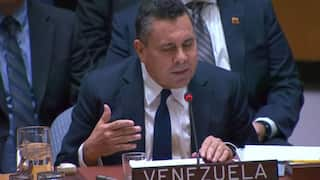Explorer
Saudi Arabia, Bahrain, UAE and Egypt cut diplomatic ties with Qatar over terrorism

FILE- In this Tuesday, Dec. 9, 2014 file photo, Qatar's Emir Sheikh Tamim bin Hamad Al-Thani attends a Gulf Cooperation Council summit in Doha, Qatar. Bahrain says it is cutting diplomatic ties to Qatar amid a deepening rift between Gulf Arab nations. (AP Photo/Osama Faisal, File)
DUBAI: Four Arab nations --Bahrain, Egypt, Saudi Arabia and the United Arab Emirates (UAE)-- cut diplomatic ties to Qatar early Monday morning, further deepening a rift among Gulf Arab nations over that country's support for Islamist groups and its relations with Iran. All four countries announced they would withdraw their diplomatic staff from Qatar, a gas-rich nation that will host the 2022 FIFA World Cup and is home to a major U.S. military base. Saudi Arabia also said Qatari troops would be pulled from the ongoing war in Yemen. The countries also were ejecting Qatar's diplomats from their territories. The Qatari government has not responded to the severing of diplomatic ties, though it has previously denied funding extremist groups. All the nations also said they planned to cut air and sea traffic. Saudi Arabia said it also would shut its land border with Qatar, effectively cutting off the country from the rest of the Arabian Peninsula. It wasn't immediately clear how Monday's announcement would affect Qatar Airways, one of the region's major long-haul carriers that routinely flies through Saudi airspace. The airline did not immediately respond to a request for comment. Etihad, the Abu Dhabi-based carrier, said it would suspend flights to Qatar "until further notice." Even before Monday, Qatar had appeared unperturbed by the growing tensions. On May 27, Qatar's ruling emir, Tamim bin Hamad Al Thani, called Iranian President Hasan Rouhani to congratulate him on his re-election. The call was a clear, public rebuttal of Saudi Arabia's efforts to force Qatar to fall in line against the Shiite-ruled nation, which the Sunni kingdom sees as its No. 1 enemy and a threat to regional stability. Qatar shares a massive offshore gas field with the Islamic Republic. Qatar is also home to the sprawling al-Udeid Air Base, which is home to the U.S. military's Central Command and some 10,000 American troops. It wasn't clear if the decision would affect American military operations. Central Command officials and the Pentagon did not immediately respond to a request for comment. Saudi Arabia said it took the decision to cut diplomatic ties due to Qatar's "embrace of various terrorist and sectarian groups aimed at destabilizing the region" including the Muslim Brotherhood, al-Qaida, the Islamic State group and groups supported by Iran in the kingdom's restive eastern province of Qatif. Egypt's Foreign Ministry accused Qatar of taking an "antagonist approach" toward Egypt and said "all attempts to stop it from supporting terrorist groups failed." The tiny island nation of Bahrain blamed Qatar's "media incitement, support for armed terrorist activities and funding linked to Iranian groups to carry out sabotage and spreading chaos in Bahrain" for its decision. The U.S. Navy's 5th Fleet, based in Bahrain, did not immediately respond to a request for comment about whether the decision would affect its operations. In Sydney, U.S. Secretary of State Rex Tillerson said he didn't believe the diplomatic crisis would affect the war against the Islamic State group in Iraq and Syria. "I think what we're witnessing is a growing list of disbelief in the countries for some time, and they've bubbled up to take action in order to have those differences addressed," Tillerson said. "We certainly would encourage the parties to sit down together and address these differences." The decision comes after Qatar alleged in late May that hackers took over the site of its state-run news agency and published what it called fake comments from its ruling emir about Iran and Israel. Its Gulf Arab neighbors responded with anger, blocking Qatari-based media, including the Doha-based satellite news network Al-Jazeera. Qatar long has faced criticism from its Arab neighbors over its support of Islamists. The chief worry among them is the Muslim Brotherhood, a Sunni Islamist political group outlawed by both Saudi Arabia and the UAE as it challenges the nations' hereditary rule. Gulf countries led by Saudi Arabia fell out with Qatar over its backing of then-Egyptian President Mohammed Morsi, a Brotherhood member. In March 2014, Saudi Arabia, the United Arab Emirates and Bahrain recalled their ambassadors from Qatar over the rift. Eight months later, they returned their ambassadors as Qatar forced some Brotherhood members to leave the country and quieted others. However, the 2014 crisis did not see a land and sea blockade as threatened now. In the time since, Qatar repeatedly and strongly denied it funds extremist groups. However, it remains a key financial patron of the Hamas-controlled Gaza Strip and has been the home of exiled Hamas official Khaled Mashaal since 2012. Western officials also have accused Qatar of allowing or even encouraging funding of Sunni extremists like al-Qaida's branch in Syria, once known as the Nusra Front. Global oil prices rose 1.24 percent to $50.57 a barrel in early trading Monday in Asia amid the Gulf diplomatic crisis. The crisis comes after U.S. President Donald Trump's recent visit to Saudi Arabia for a summit with Arab leaders. Since the meeting, unrest in the region has grown. At that Saudi conference, Trump met with Qatar's ruling emir Sheikh Tamim bin Hamad Al Thani. "We are friends, we've been friends now for a long time, haven't we?" Trump asked at the meeting. "Our relationship is extremely good."
Related Video
Punjab News: AAP Leader Shot Dead During Wedding in Amritsar
Follow Breaking News on ABP Live for more latest stories and trending topics. Watch breaking news and top headlines online on ABP News LIVE TV

Justin M Bharucha
Opinion




































